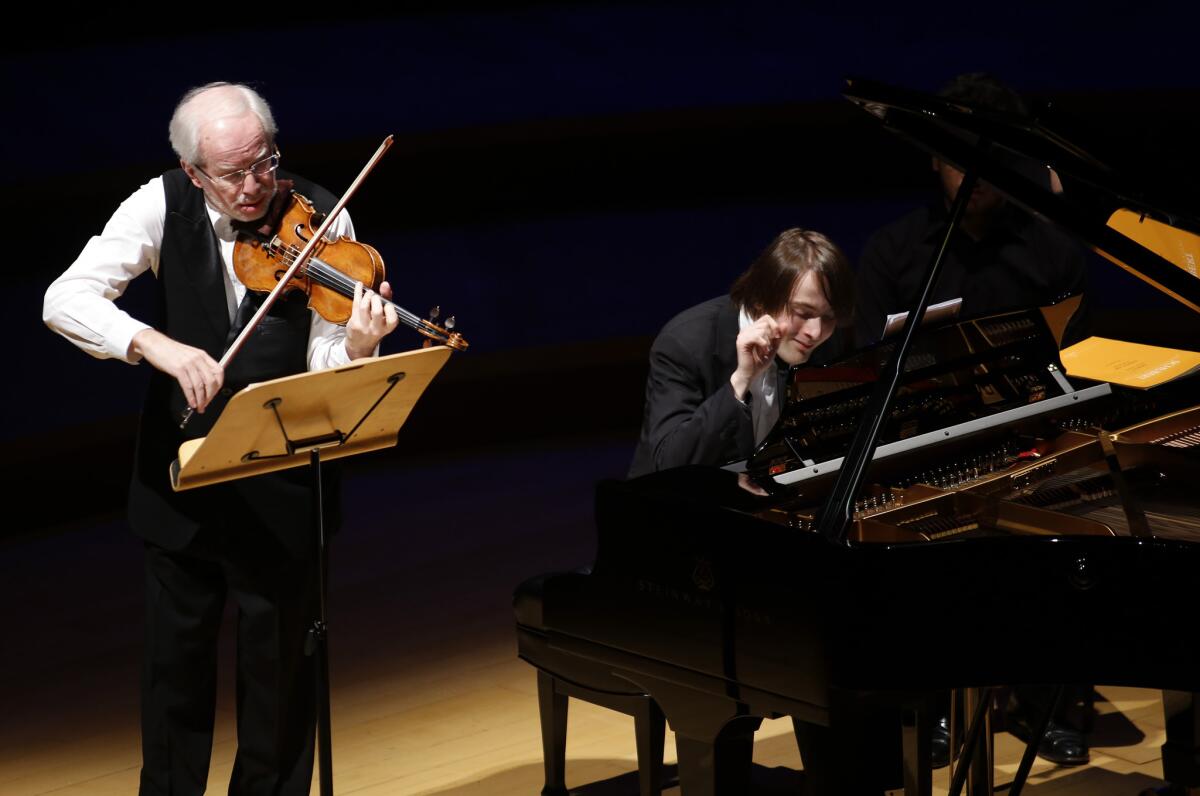Review: Gidon Kremer shares a performance of a lifetime

- Share via
When Herbert von Karajan famously called Gidon Kremer the greatest violinist in the world in 1976, the legendary German conductor didn’t know what he was talking about.
Kremer was the best. He had taken Moscow by storm six years earlier at Tchaikovsky Competition. His technique was dazzling. He was an intense, searing, original interpreter.
But Kremer achieved greatness for more than that, and in ways Karajan could not have then anticipated. The Latvian violinist — who appeared in a riveting recital at Walt Disney Concert Hall on Wednesday night with the hot young Russian pianist, Daniil Trifonov — has become the conscience of the music business.
He has used his celebrity to promote important new music, introducing the West to such Russian and Eastern European composers as Alfred Schnittke, Arvo Pärt and Sofia Gubaidulina. Kremer was the first international star soloist to promote Philip Glass, or any Minimalist, for that matter.
He has founded festivals and ensembles that exist not for profit but for pleasure. He advocates for human rights. He serves mentors and champions young players. He has written intriguing books that deserve translation from their original German.
That role of guide was evident in Mozart’s Violin Sonata in E-Flat Major, K.481 and Schubert’s Fantasy in C Major, D.934, which Kremer played with Trifonov on the first half of Wednesday’s recital.
At 67, an age when many violinists begin losing strength in their bow arms, Kremer may not have the vibrancy of tone that was once one of his hallmarks.
So Mozart’s sonata was a savvy opener because it gives the piano a prominent role, allowing Kremer a grace period for warming up. But it was savvy for a more important reason.
The 23-year-old Trifonov, the Tchaikovsky Competition winner in 2011 making his Disney debut, is an exceptionally vibrant player. His tone is radiant. He plays with great excitement.
Kremer refrained from inhibiting a young pianist’s high Mozartean spirits, remaining, instead, in the background and giving such quietly nuanced turns of phrase that the pianist had to pay close attention to the shading of every note.
Schubert’s Fantasy opens with a gorgeous violin luminously arising from a glittery piano tremolo. Trifonov began in a state of sparkle. Suddenly a more dominating presence, Kremer turned that sparkle into pure magic. That sense of enchantment was never violated over the next 25 minutes.
The rest of the recital was to have been an example of Kremer’s long devotion to vitalizing the violin repertory. The original program announced Philip Glass’ recent Violin Sonata and a sonata by Mieczyslaw Weinberg, the Polish Russian contemporary of Shostakovich who Kremer has been influential in bringing attention to lately (his new Weinberg recording is nominated for a Grammy).
These were ultimately replaced by Rachmaninoff’s Trio No.2., for which Lithuanian cellist Giedre Dirvanauskaite, a regular Kremer partner, joined the duo. There was no explanation for the switch, but Rachmaninoff’s trio happens to be a surprisingly neglected score.
It is a long, brooding memorial to Tchaikovsky written by a 20-year-old who was already recognizably Rachmaninoff. But the composer is not yet in control of his emotions. His grief over losing Tchaikovsky is explosive. The middle movement, a touching Tchaikovskian set of variations, lives up to the master. In the last movement, Rachmaninoff tries to get a hold of himself and fails, returning to his somber opening.
Kremer’s trio did not try to make amends for youth but instead reproduced it for us in the troubling and inspiring complexity of a Chekhov play.
Trifonov brought an arresting concentration and ferocity. Dirvanauskaite added a rapturous, soulful expressivity.
This was a performance of a lifetime.
As if intended to buck up Rachmaninoff, Kremer’s encore was a trio by Rodion Shchedrin’s called “Let’s Play an Opera by Rossini.” It was hilarious.
More to Read
The biggest entertainment stories
Get our big stories about Hollywood, film, television, music, arts, culture and more right in your inbox as soon as they publish.
You may occasionally receive promotional content from the Los Angeles Times.











